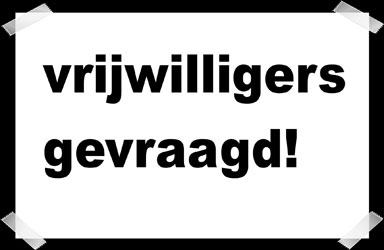 Praag – 3 mei 2010. Afgelopen oktober presenteerden Amerikaanse onderzoekers in Science een doorbraak rond het chronisch vermoeidheidssyndroom (ME/CVS). In het bloed van ME/CVS-patiënten vonden ze sporen van het retrovirus XMRV. Daarna konden drie groepen onderzoekers, waaronder één uit Nijmegen, deze bevindingen niet bevestigen. De eerste positieve ‘replicatiestudie’ lijkt echter slechts een kwestie van tijd, zo bleek tijdens de ‘Centennial Retrovirus Meeting’ in Praag.
Praag – 3 mei 2010. Afgelopen oktober presenteerden Amerikaanse onderzoekers in Science een doorbraak rond het chronisch vermoeidheidssyndroom (ME/CVS). In het bloed van ME/CVS-patiënten vonden ze sporen van het retrovirus XMRV. Daarna konden drie groepen onderzoekers, waaronder één uit Nijmegen, deze bevindingen niet bevestigen. De eerste positieve ‘replicatiestudie’ lijkt echter slechts een kwestie van tijd, zo bleek tijdens de ‘Centennial Retrovirus Meeting’ in Praag.
In het juninummer van het tijdschrift Ortho zal uitgebreid aandacht worden besteed aan het meerdaagse congres in Praag, dat vandaag haar laatste dag beleeft. Vooral in de wandelgangen was het jongste retrovirus het gesprek van de dag. Insiders zijn het erover eens dat de negatieve XMRV-studies die tot nu toe zijn gepubliceerd, géén zuivere replicatiestudies waren. Daarvoor week de aanpak van de verschillende onderzoeksgroepen te veel af van die van de Amerikaanse onderzoekers. Dit bezwaar geldt ook voor een nog ongepubliceerde Duitse studie, waarin evenmin XMRV werd aangetroffen in bloedmonsters van ME/CVS-patiënten.
De afgelopen tijd bezocht de Amerikaanse onderzoeksleider dr. Judy Mikovits verschillende Europese onderzoeksgroepen om hen te onderrichten in de juiste laboratoriumtechniek. Het is inmiddels duidelijk dat deze bezoeken vruchten beginnen af te werpen. Ook tijdens het Praagse congres lichtte Mikovits de complexe methodiek van het Whittemore-Peterson Institute (WPI), het National Cancer Institute (NCI) en de Cleveland Clinic nog eens uitgebreid toe. Deze methodiek, waarbij het virus wordt opgekweekt, is noodzakelijk omdat XMRV slechts in uiterst lage concentraties aanwezig is in het perifere bloed.
Dr. Francis Ruscetti van het gerenommeerde NCI – een Amerikaanse overheidsinstelling – sprak tegenover Ortho de hoop uit dat in 2011 de controverse de wereld uit zal zijn. Hij verbaast zich vooral over het feit dat de onderzoekers van het UMC St. Radboud in hun publicatie verzwegen dat de Amerikanen in bloedstalen van dezelfde Nederlandse patiënten wél sporen vonden van XMRV. “Ik weet niet hoe zij ethisch daarmee denken weg te komen”, aldus Ruscetti. “Ik denk niet dat dit goede wetenschap is.”
Ruscetti wees er nog eens op dat het WPI, het NCI en de Cleveland Clinic vier procedures toepasten bij hun onderzoek. “In de negatieve studies is slechts één procedure geprobeerd.” Ruscetti ventileerde tevens zijn ergernis over wat hij noemt de ‘fluistercampagne’ over contaminatie. Want volgens de Nijmeegse onderzoekers zouden de Amerikanen de Nederlandse bloedstalen hebben gecontamineerd ofwel vervuild.
Ruscetti kan onder meer rekenen op de steun van prof. dr. John Coffin, die zowel verbonden is aan het NCI als aan Tufts University in Boston. Hij geldt als een van de meest vooraanstaande retrovirologen ter wereld. “Mensen hebben de kwestie opgeworpen van contaminatie”, zei Coffin. “Maar daarover is niets bekend op dit moment. Er is geen enkel bewijs voor. Een groot deel van het onderzoek is gedaan bij het NCI, in het laboratorium van Francis en Sandra Ruscetti. Zij hebben een lange ervaring met dit soort virussen en gaan zeer voorzichtig te werk.”
Coffin benadrukte nog eens dat het doen van een replicatiestudie inhoudt dat deze op exact dezelfde wijze wordt uitgevoerd. “In géén van de negatieve studies die tot nu toe zijn gepubliceerd, is het virus opgekweekt”, vertelde Coffin. “Alleen in de Science-studie is dat gebeurd, en dat is een zeer sterk punt.”
De onderzoekers uit Nijmegen ontbraken op dit toonaangevende congres.
Patiënten, professionals en de media kunnen het laatste nieuws over ME/CVS, XMRV (en bloedtransfusie) volgen op www.voedingenpsyche.nl. Dit is de website van het Congres Voeding & Psyche, dat dit jaar volledig in het teken zal staan van ME/CVS.
Ortho – Orthomoleculair Magazine – www.ortho.nl/orthomoleculair-magazine.
Tweemaandelijks wetenschappelijk magazine over voeding & supplementen.
Hoofdredactie: dr. Gert E. Schuitemaker. Tel: 0315-695211.
Dutch Press release : Positive ‘XMRV-study’ a matter of time
 Prague – May 3, 2010. Last October U.S. scientists presented a breakthrough around the research on chronic fatigue syndrome (CFS), which was published in Science. They found traces of the retrovirus XMRV in the blood of CFS patients. Thereafter, three groups of European researchers, including a Dutch group from Nijmegen, couldn’t confirm these findings. However, at the ‘Centennial Retrovirus Meeting’ in Prague it became clear that the first positive ‘replication study’ seems only a matter of time.
Prague – May 3, 2010. Last October U.S. scientists presented a breakthrough around the research on chronic fatigue syndrome (CFS), which was published in Science. They found traces of the retrovirus XMRV in the blood of CFS patients. Thereafter, three groups of European researchers, including a Dutch group from Nijmegen, couldn’t confirm these findings. However, at the ‘Centennial Retrovirus Meeting’ in Prague it became clear that the first positive ‘replication study’ seems only a matter of time.
The June issue of the Dutch magazine Ortho will focus on the multi-day conference in Prague, which ends today. Especially in the corridors this new retrovirus was the talk of the day. Insiders agree that the negative XMRV-studies which have been published so far, were not exact replication studies. The several groups of researchers used techniques that differed too much from those used by the U.S. researchers. This is also true for a yet unpublished German study, where XMRV wasn’t found in blood samples from CFS patients either.
Recently the American scientist Dr. Judy Mikovits visited several European research groups to help them with the proper laboratory technique. It is now clear that these visits are starting to pay off. During the Prague Conference Mikovits explained once more in great detail the complex methodology of the Whittemore-Peterson Institute (WPI), the National Cancer Institute (NCI) and the Cleveland Clinic. This methodology of culturing the virus is imperative because XMRV is only present in extremely low concentrations in the peripheral blood.
Dr. Francis Ruscetti of the renowned NCI – an U.S. government agency – told Ortho that he hopes this controversy will all die away in 2011. He is especially surprised about the fact that the investigators of the UMC St. Radboud at Nijmegen concealed in their publication that the Americans found traces of XMRV in the same blood samples from the Dutch patients. “I don’t know how they get away ethically with this,” said Ruscetti. “I don’t think that is good science.” Ruscetti pointed out again that the WPI, the NCI and the Cleveland Clinic applied four procedures in their research. “In those negative studies they only tried one.” Ruscetti also ventilated his annoyance over what he calls the “whispering campaign” about contamination. According to the Nijmegen researchers, the Americans contaminated or polluted the Dutch blood samples.
Among others Ruscetti is supported by Prof. Dr. John Coffin, who is linked both to the NCI and Tufts University in Boston. He is considered one of the most prominent retrovirologists in the world. “People have raised the issue of contamination,” said Coffin. “But we don’t really know anything about that yet. We don’t have any evidence. A lot of the studies were done in fact at the NCI, in the lab of Francis and Sandra Ruscetti. They have a long experience with these viruses and are very carefull workers.”
Coffin emphasized once again that doing a replication study implies that it is performed in exactly the same way. “In none of the studies that have been published so far that were negative, the virus was cultured,” said Coffin. “Only the Science-study did this, which is a very compelling point.”
Researchers from Nijmegen were not present at this leading conference.
Patients, professionals and the media may read the latest news on ME / CFS, XMRV (and blood transfusion) on www.voedingenpsyche.nl . This is the website of the Congress Food & Psyche, which will be devoted entirely to ME / CFS this year.





